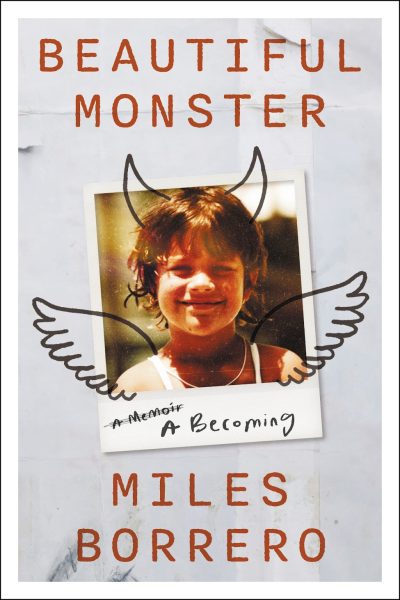Miles Borrero didn’t initially set out to write a book. He started by writing a blog of essays about how philosophy can be put into practice. As people he knew read the essays over the years, they suggested that he write a book of them — which eventually turned into “Beautiful Monster: A Becoming.”
As he was putting the essays together, Borrero realized that the story that needed to be told was a different story.
“The reason I wanted to write it was because even though it’s about transitioning, figuring out I was trans has been a complex issue,” Borrero said. “As it is in a society that really doesn’t see you or acknowledge you, where you are invisible, and you don’t have any role models. My story, even though it’s been difficult at times, has been a positive story.”
He said that his story is about being trans and being in your joy; being in your life in a way that has a purpose; being able to do the things that you like to do and to affect the world in your own way.
Borrero said he realized that most of the trans stories he’s heard are: “So horrible. Your heart just bleeds even just considering them. It felt, especially in this political climate, to have something positive and honest that looks at the challenges in not just a depressing kind of way, but from a humorous standpoint.”
He added that life isn’t perfect and is challenging.
“My hope was to put something forth that was positive,” he said. “I grew up with not a single person where I could find resonance.”
A Fascinating Journey
Borrero started transitioning at the age of 40. He didn’t see anyone like himself for a very long time and didn’t even know what being trans was for a long time. But he hopes people who read “Beautiful Monster: A Becoming,” can see themselves reflected in his story.
The main theme of the book “is about joy and love, where the universal qualities of being human are so universal that anyone can relate to it,” said Borrero. “My hope is that people who aren’t trans can read it and relate to it to some degree.”
Borrero will be speaking at the University of Utah on Nov. 9 with Associate Professor Robert Scott Smith at the Department of Theater. A Q&A will take place after and Borrero will be signing copies of his book.
Borrero said he’s a huge fan of young adult literature. He really wanted the book to feel like the hero’s journey “in the sense that there’s some magic that comes into it,” he said. “The hero finds this magic and then at the end of the book there’s a releasing of the magic because they realize that there is nothing really better than being exactly who you are.”
Borrero said that the wish to be something else is not really necessary. The book is really about about expanding one’s awareness.
Borrero starts the book with his father’s death, which coincides with his decision to transition. His transition was informed by his father’s illness in some ways as well.
“For me, because I am Latin, and I am so entrenched in my family, and so committed to my family, I resisted transitioning for a long time,” he said. “I was afraid and thought I would lose them. I think a death puts things into such a different lens and reorganizes your priorities in such a way that it really distills the stuff that’s important.”
This pivotal moment in Borrero’s life is where he took the leap to fully embrace his full self for the first time.
Growing Up
When Borrero was younger, he never felt like a girl. When he played with other children, nobody really thought about gender in that way. But Borrero said the socialization is still very strong. Once he hit puberty he had to quickly act like a girl for his own survival. He thinks a common misconception cisgender people have is that being transgender is about being in the wrong body. During our interview, he reiterated that the reality more often is about living in a society that perceives and treats you in a way that doesn’t feel right internally.
Borrero grew up during the Escobar years, which he said was scary.
“There were bombs going off everywhere. People were getting murdered and kidnapped,” Borrero said. “The guerilla groups and the cartel were sometimes at odds, but they were creating this huge wave of terror. The way that they did it was to do these random acts of terror so that people were just terrified all the time … you never knew where it was going to strike.”
Borrero mentioned that terror could strike at shopping malls, schools and anywhere that citizens might be.
“What that did is created this environment where every minute felt like the last minute of your life,” said Borrero. “So, in some ways, it was a really crazy, wild and also very fun in a kind of psychotic way to grow up in. The shadow of death was so close that we loved really hard and we partied really hard.”
When Borrero moved to Salt Lake City he realized just how much that affected him and his nervous system. Despite all of the violence that occurred in his home country, he said that he had an amazing childhood. He was surrounded by people who really loved each other. He remembers fondly being a horseback rider and spending time around the stables.
“It was a lot like opera,” Borrero said. “They had this saying, chiaroscuro, which is the light and the dark, and it had both sides to it in an extreme way.”
Borrero also explores working as an actor after graduating from the U’s theater department. As he got deeper into acting, he was pigeonholed into stereotyped Latina roles.
“As I started to try and create a career out of that femininity to some degree, it started really grading on me and creating some difficulty,” he said.
Eventually, Borrero had to look closer and reconsider the gendered restrictions of the acting profession.
“I got sick of not feeling represented story-wise,” he said. “It wasn’t just the auditions and having to dress in high heels and dresses. It was like, ‘Why I am doing this thing to continue to strengthen these cultural norms that I don’t even believe in?’”
Gender-Affirming Healthcare Saves Lives
A large aspect of Borrero’s story centers around how receiving gender-affirming care saved his life.
“I don’t think anyone should be denied healthcare,” Borrero said. “Cis men and cis women and cis girls and cis boys get gender-affirming healthcare to affirm their gender, so I don’t see it as any different. Just because people might not align with the gender that most people want them to be does not mean that they should not have the right to healthcare.”
He also mentioned how gender-affirming care is crucial to lowering suicidal ideation rates, especially among children. According to the JAMA Network, gender-affirming care reduced moderate or severe depression by 60% and suicidality by 73%.
Borrero said gender-affirming healthcare has helped him in every aspect of his life.
“Honestly, getting rid of my breasts was the absolute best thing that has ever happened to me,” he said.
He added that he thought long and hard before going on hormones.
“Now when I look at myself in the mirror I see myself,” he said. “I don’t think cis people can really understand what it feels like to not see yourself, not only in your physical body but not see yourself in the world on a daily basis in every corner of society, to unsee yourself everywhere you go. But that burst of joy is something that is priceless for what it does for me.”
Borrero isn’t phased by his book potentially becoming banned in red state schools across the country. According to NPR, most of the books under scrutiny in 2023 were written by or about people of color and members of the LGBTQ+ community.
“I love being a little bit of an outlaw,” Borrero said. “So, I have to say that it tickles me a little bit the thought of possibly being banned. I hope I get banned somewhere; I feel like that’s going to mean that I am doing something right.”
Borrero brought up the example of books being banned recently, which only brings more attention to them.
“They are banning Shakespeare, they are banning Black history, they are banning everything that isn’t cisgender, white and heterosexual,” he said.
It took Borrero five years to write “Beautiful Monster: A Becoming.”
The power of words was a driving factor in Borrero’s decision to write his book.
“I feel like what we say matters, which is why something as simple as a pronoun really matters,” he said. “It’s such a small thing that we can do for one another and people just resist it so hardcore and it means the world to somebody.“
He added that writing the book because it allow him to “align his speech with my insides.”
What it Means to Be a Monster

Borrero said the title of the book is inspired by “the common misconception of trans people that we are monsters.” He added that he grew up feeling like he would become a monster if he transitioned.
“When I didn’t even know if I was trans, I remember sitting in the theater and watching “Boys Don’t Cry” when it came out,” he recalled. “I was one of the few people in the audience. I remember seeing Hilary Swank representing Brandon Teena and being like ‘Oh my god, I’m like that.’ I also remember the next thought which was, ‘I can never be like that, because that is what happens to people like that.'”
Borrero said that he thinks we come from a culture that has made “us into monsters.” “I wanted to play with this idea of what is a beautiful monster,” he said. “When I decided to transition I was like, ‘Well if that’s what’s coming, if I am going to turn into a fucking monster then bring it, let me see how horrible this monster is.’”
He likened this feeling to having a connection to monsters in Greek mythology like the Minotaur, sirens or even Medusa.
“I feel like queer and trans culture is kind of obsessed with them because they are us, and we are them,” he said. “As trans people, not only in mythology but in native and ancient cultures, we were the shamans, we were the healers, we were the people who lived in that liminal space. All of these characters live in that liminal space. I wanted to explore that a little bit. What is it like to live in that liminal space? What does it mean?”
He said that the future of gender in his ideal “would just be wide open spaces. It would just be a playground where people can express themselves. I don’t see any reason why it would have to be limited.”
Ultimately, Borrero and his story are a torch in the darkness in these turbulent times. If his hopes for the future say anything, trans joy is of the utmost importance.
Borrero’s book “Beautiful Monster: A Becoming” can be found wherever books are sold.




















